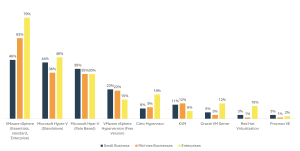Oracle Solutions
Dec 23, 2024
Unlocking the Power of Autonomous Database on OCI
The Autonomous Database on Oracle Cloud Infrastructure (OCI) is revolutionising how businesses manage their data, offering unprecedented automation, scalability, and…
Oracle Solutions
Published on August 21, 2024

Virtualisation is a cornerstone of modern IT infrastructure, enabling businesses to optimise resources, scale efficiently, and reduce costs. Although VMware is a major player in this space, Oracle KVM is fast catching up. This blog post compares their features, costs, market growth, and prospects, and explores why Oracle KVM may be particularly advantageous for Oracle database customers.
| Feature | Oracle KVM | VMware |
| Hypervisor Type | Xen-based | ESXi (bare-metal) |
| Management Tools | Oracle Linux Virtualization Manager | vCenter Server |
| Supported Guest OS | Broad range including Oracle Linux, Windows, Solaris | Wide range including Linux, Windows, Solaris |
| Integration | Tight integration with Oracle services and products | Extensive third-party integrations |
| High Availability | Yes | Yes |
| Live Migration | Yes | Yes (vMotion) |
| Storage Management | Oracle VM Storage Connect | vSAN, VMFS, NFS |
| Networking | Oracle VM Virtual Networking | NSX |
| Hard Partitioning | Yes | No |
| Backup and Recovery | Oracle Recovery Manager (RMAN) | vSphere Data Protection, third-party tools |
| Licensing | Included with Oracle products | Separate licensing |
| Aspect | Oracle KVM | VMware |
| License Cost | Included with Oracle products | Varies; Higher costs, especially for vSphere Enterprise Plus |
| Support Cost | Generally Lower, included with Oracle support contracts | Higher Support costs, depending on service level |
| Initial Cost Setup | Lower, due to inclusion with Oracle | Higher, due to separate licensing |
| Total Cost of Ownership (TCO) | Lower for Oracle-Heavy environments | Higher especially with additional features |
Oracle KVM:
VMware:

[Src: Spiceworks survey]
Hard partitioning in Oracle KVM enables administrators to allocate specific CPU cores to virtual machines, which is beneficial for Oracle database customers because it:
Both Oracle KVM and VMware offer robust virtualisation solutions, each with distinct advantages. Oracle KVM is particularly suited for enterprises reliant on Oracle databases and applications, providing cost efficiency, tight integration, and the benefit of hard partitioning. VMware remains a versatile choice for diverse and large-scale environments, with a comprehensive feature set and a strong market presence. Organisations should consider their specific needs, existing investments, and future growth plans when choosing between Oracle KVM and VMware. For Oracle-centric environments, Oracle KVM offers compelling benefits that align well with Oracle’s broader ecosystem and strategic direction.
Yotta’s suite of Oracle solutions empowers businesses to streamline operations and achieve transformative outcomes by eliminating complexities. With all Oracle services— from software and licenses to infrastructure—delivered under one roof, Yotta simplifies deployment and management, backed by dedicated technical support and robust infrastructure. The flexible, pay-as-you-go model ensures transparent pricing, while Yotta’s Oracle Service Portfolio covers everything from consulting and migration to database implementation and managed services, maximizing success across business functions.

Oracle Solutions
Dec 23, 2024
The Autonomous Database on Oracle Cloud Infrastructure (OCI) is revolutionising how businesses manage their data, offering unprecedented automation, scalability, and…

Oracle Solutions
Nov 14, 2024
Migrating an Oracle Database is a significant process for organisations aiming to modernize infrastructure, improve performance, or transition to the…

Oracle Solutions
Jul 25, 2024
Selecting the right database solution is crucial for financial institutions, where data integrity, security, and performance are paramount. Oracle offers…